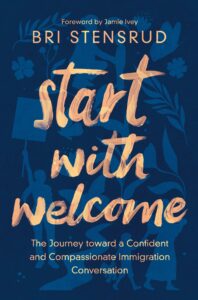We can feel like there is nothing we can do to help show care to vulnerable people in our communities. We can believe our little effort isn’t enough.
Yet, the Body of Christ has many parts and we each have a role to play. Every small step of welcome adds up to great love.
Joanne, Sarah, Jenn, and Sheila met because they are all a part of the Women of Welcome community. They each found themselves moved by a story of a migrant father and his young daughter and wanted to do what they could to help. Their stories woven together are a beautiful example of what this community is capable of when we work together.
Hear how the story began when Alex connected with Joanne.
Next, let’s hear from Sarah about how Joanne’s call for help in the Women of Welcome community led to her getting involved.
Today we read how Jenn, who shared about the resources of the organization she works for in the private group, got connected and was able to offer housing and medical assistance for Alex and his daughter.
Serving the Most Vulnerable – Jenn’s Story

“I’m the Director of Operations for DASH, a housing program in Fort Worth, TX for asylum seekers. We provide free housing for up to six months after they get their work authorization papers—along with groceries, ESL classes, and assistance with other services. I posted about our program on Women of Welcome [in the private Facebook group] and Joanne reached out and asked me to call her. Joanne explained Alex’s situation and how she thought we would be a good fit. I interviewed him and within two weeks, he moved into an apartment.
It was our first time bringing in a single dad with a daughter. It was a new experience for us. In the apartment, they had the master bedroom and a bathroom and then shared the common areas with another family. When I originally interviewed Alex, he told me he only needed a cream to get his medical condition under control. It was shocking when I met him in person and realized his condition was much more serious and he would need medical intervention. Our case worker, who is normally the person equipped to handle things like that, was out of the office, but I was able to find him a free medical clinic. When he went in for his appointment, they sent him straight to the hospital because his condition was so severe.
He stayed in the hospital for three days and his daughter Cinthia lived in our women’s apartment. They were all like moms to her. It was really sweet. Some spoke Spanish and some didn’t, but they found a way to take care of her. I’m glad it worked out because we didn’t want her to be taken away from Alex.
When he got home from the hospital, we had to navigate how to get him signed up for a low-cost no insurance payment plan, free prescription refills, and schedule follow-up appointments with his doctor. Thankfully we’ve got some incredible volunteers at DASH who stepped in to help. Our transportation coordinator took Alex under his wing and made sure he got to the hospital for all of his appointments.
Another challenge we faced was getting Alex to engage with his community. By this point, he was accustomed to just staying in his room, and coming out was uncomfortable. My friend’s husband is an occupational therapist and he was able to come for home visits to work with Alex. We also encouraged Alex to come to English classes and made them more accessible for him.
Our goal is to help residents transition to independence and they usually stay with us for five or six months while they receive work authorization. Alex and Cinthia stayed with us much longer due to his medical conditions. Honestly, looking back, if we would have known the full extent of his conditions he probably wouldn’t have qualified for our services because we weren’t equipped to care for him. But, knowing what we know now, Alex and Cinthia are exactly who we should be caring for at DASH! Our mission is to serve the most vulnerable people and we did just that! Alex and Cinthia have experienced persecution and severe trauma. He was unable to work even though he had work authorization, which removed dignity, opportunity, and even hope. Hopefully, we were a source of hope for their family while he recovered.”
Continue reading how the lives of these Women of Welcome intersected when they put action to their compassion and became a part of Alex and Cinthia’s lives:
Part 4: Sheila’s Story
Part 5: The Women of Welcome Story

 Let’s have the conversation you’ve always wanted to have about immigration.
Let’s have the conversation you’ve always wanted to have about immigration.